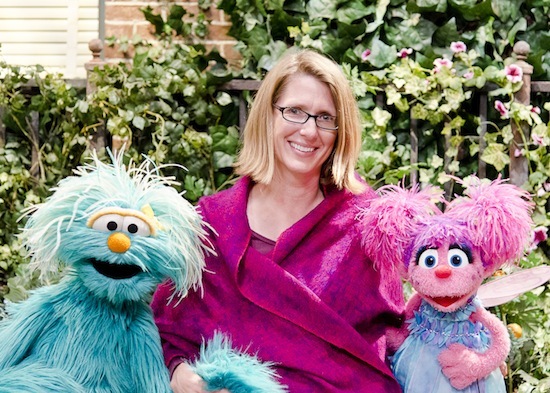Professor helps ‘Sesame Street’ reach children of imprisoned parents

Psychologist Julie Poehlmann worked as an advisor for “Sesame Street” on developing materials that will help children who have a parent who is incarcerated. Poehlmann got to meet Muppets Rosita (left) and Abby Cadabby.
Photo: Gil Vaknin © 2013 Sesame Workshop
It doesn’t get talked about much, yet nearly 2.7 million children are growing up with a parent who is in prison, according to the U.S. Department of Justice.
What do you tell those kids? What don’t you tell them?
“Half of families say nothing,” says psychologist Julie Poehlmann, a professor in the School of Human Ecology. “Another third say the parent is in the hospital or something like that. They don’t know how to talk about it.”
Poehlmann doesn’t have all the answers, but for the past two years, she’s worked as an advisor for “Sesame Street” on developing materials that will help these children and the people who are taking care of them.
Sesame Workshop, the nonprofit educational organization behind “Sesame Street,” is today unveiling “Little Children, Big Challenges: Incarceration,” an initiative aimed at families with young children who have an incarcerated parent. The announcement is being made at the White House as part of a “Champions of Change” event, which Poehlmann is attending, to honor people and organizations who are making a difference in communities helping children and their incarcerated parents.
“The more our society can recognize the need to talk about this issue, the less stigmatized these kids will be.”
Julie Poehlmann
Multimedia resource kits have been created for kids containing a DVD, a guide for parents and caregivers and a storybook, all of which will be distributed through targeted outlets in communities to reach these families. Information is also available online.
The number of children with an incarcerated parent has increased nearly 80 percent in the past 20 years.
Kids often feel confused or guilty and wonder if there was something they did wrong. School can also be difficult, especially when kids talk about their parents or when there are events that parents usually attend.
“It really is a heavy topic but one that needs to be talked about,” Poehlmann says.
The DVD features Alex, a new Muppet whose dad is in prison. He talks to an adult about how he feels and gets the support of fellow Muppets Abby Cadabby and Rosita, who sing “You are Not Alone,” a song with an important reminder for kids.
Poehlmann earned her master’s and doctoral degrees in child clinical psychology at Syracuse University. While a child psychologist in New York, she noticed that many of the children she was seeing had something in common: a parent who was in jail or prison.
Since then, she’s studied the development of these children and worked with others on how they can be helped.
“Even though they are at a higher risk than other children, there are a lot of things we can do to support and help them,” Poehlmann says. “The more our society can recognize the need to talk about this issue, the less stigmatized these kids will be.”
As a fan of “Sesame Street,” Poehlmann is thrilled for the opportunity to reach so many kids and families with a show she grew up watching.
Poehlmann completed a post-doctoral fellowship in developmental psychopathology at the Waisman Center and has been a professor in the Human Development and Family Studies Department in the School of Human Ecology since 1999. She is also an affiliate of the Institute for Research on Poverty.
As a fan of “Sesame Street” — her favorite Muppets are Elmo and Grover — Poehlmann is thrilled for the opportunity to reach so many kids and families with a show she grew up watching.
“They’ve been trailblazers on so many issues,” she says.
Sesame Workshop had previously put out a multimedia kit for children who have a parent in the military.
Subjects for caregivers include how to prepare children for visits, ways to help them stay connected and ways to help them talk about their feelings about what’s happening.
“We need to help kids realize it’s not their fault,” Poehlmann says.
Poehlmann was part of an advisory board of key experts in child development and mental health, in addition to professionals working with incarcerated families, to guide and shape key content messages and initiative goals. Sesame Workshop also conducted discussion groups with at-home caregivers, incarcerated parents, and service providers to ensure that all of the resources effectively meet the needs of children and families.
“Sesame Workshop has always been at the forefront of creating resources for families with young children to help address some of life’s most difficult issues,” says Jeanette Betancourt, senior vice president for outreach and educational practices at Sesame Workshop. “’Little Children, Big Challenge: Incarceration’ tackles a very difficult topic, one for which there are scant resources to help young children, and best of all, it approaches these difficult transitions in the way that only Sesame Street and our trusted Muppets can.”
Sesame Workshop is working closely with advisors and partners to distribute and integrate “Little Children, Big Challenges: Incarceration” resources into correctional facilities and organizations that specialize in early childhood education, mental health and counseling, parenting programs, foster care and that have missions specific to helping families cope with the incarceration of a loved one. Sesame Workshop will also begin to pilot distribution of multimedia kits in several key states, including Wisconsin.
It wasn’t that long ago that this issue was barely talked about, Poehlmann says. She’s thrilled to help get the discussion started — with the help of the Muppets.
“All efforts help, but so much more is needed,” Poehlmann says. “This is an exciting start. It’s an important step in the right direction.”



